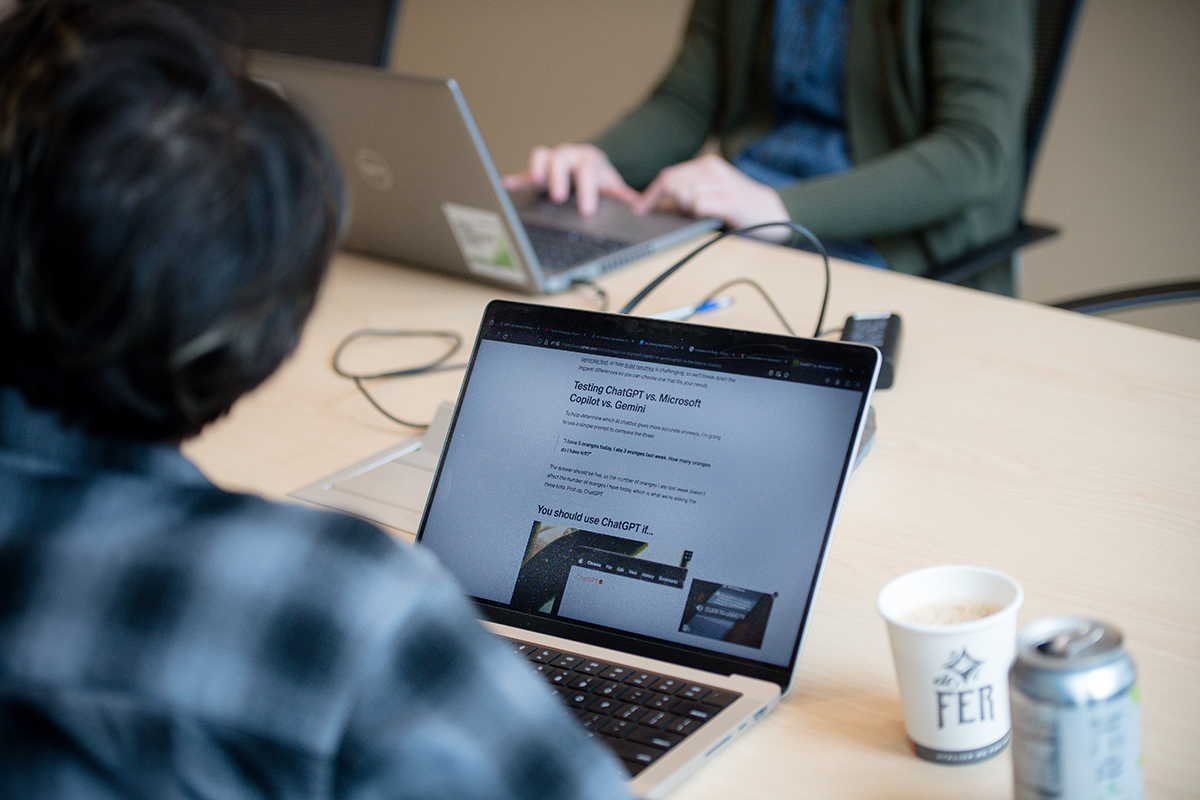
by Sarah Bender, Communication Coordinator
In an increasingly digital landscape, AI, data, and information literacy are more critical than ever to students' future success as professionals, informed citizens, and lifelong learners. To help Carnegie Mellon students master this core competency, the University Libraries is finding new and innovative ways to navigate and evaluate the evolving data and information ecosystem, fostering more informed and literate communities both in Pittsburgh and at institutions across the country.
In August 2024, the Institute of Museum and Library Services (IMLS) awarded a grant of $165,000 to Associate Dean for Academic Engagement Nicky Agate to support an initiative called Project on Open and Evolving Metaliteracies (POEM). POEM is designed to improve student literacy in AI and algorithms, data and computation, and media and disinformation. It consists of an iterative, community-reviewed, curated, bilingual collection of flexible open educational resources used by high school and college instructors and librarians.
The resources included in the collection can range from a rubric or syllabus to in-class exercises or a digital project, and even an executable notebook, a video, or a podcast. Others are then free to reuse the content in their own classrooms, and adapt or modify the resources for a more appropriate fit.
“In an increasingly complex media and mediated environment, the importance of literacy, fluency, or competency has expanded from a focus on information literacy to encompass a range of digital fluencies, particularly those pertaining to computation, data, and mis/disinformation,” Agate explained. “So, POEM is an intervention — a robust platform that supports the development of critical skills in algorithmic thinking, data analysis, media literacy, and digital citizenship, to help its users gain a deeper and critical understanding of the ways data and computation, algorithms and AI, and media and dis/information are produced, deployed, and used in everyday life.”
Each of the three literacy areas will be organized into a set of 10 topics or keywords. These keywords will feature a handful of teaching and learning objects that represent a diverse range of perspectives, voices, learning modalities, and methods.
Because POEM will have both Spanish/English bilingual content and a bilingual interface, thanks to a team of paid student translators, it will be accessible to the almost 42 million Spanish speakers in the U.S. — who make up over 61% of the speakers of languages other than English in American homes. Furthermore, because of its status as an open educational resource, POEM can be translated and adapted into other languages and cultures, enriched with other examples, and enhanced and updated through integration with other open materials.
Libraries specialists are uplifting efforts to increase AI literacy in other ways as well. In the spring of 2024, the Libraries hosted an AI Literacy Resource Hackathon. During the event, academic librarians, staff, and other interested parties from 17 different institutions around the country gathered to develop open educational materials on the emerging principles of AI literacy.
Initially, the group was guided through a series of brainstorming segments to consider AI literacy topics that fall under three broad categories: technical AI literacy (how AI works), practical AI literacy (how it can be used effectively), and ethical AI literacy (societal implications and misuse). Themes ranged from intersections with sustainability and comparing tools to hallucinations and privacy concerns.
After brainstorming various topics, participants were split into eight teams to create educational materials on a theme assigned to them. These teams developed resources to help teach their subject to a variety of audiences. The resources took a variety of forms — from exercises for prompt engineering to infographics on bias in AI models — and a full collection of the materials created can be found on the Hackathon’s Open Science Framework project site.
Then, just last month, Data Education Librarian Emma Slayton kicked off the first meeting of the AI Community of Practice (AI COP). This group is intended to bring together academic librarians from different perspectives to think through the challenges and opportunities presented by the development of AI in educational and community spaces.
To date, more than 970 people from at least 13 countries and all 50 states have joined AI COP, from a variety of organizations and institutions including universities, community colleges, and government organizations. At the first meeting, attendees tuned in to a webinar to listen to speakers like Helen and Henry Posner, Jr. Dean of the University Libraries Keith Webster and Associate Dean for Digital Infrastructure Sayeed Choudhury, as well as Sarah Lamdan, deputy director for the American Libraries Association (ALA) Office for Intellectual Freedom and Jason Coleman, professor at Kansas State University Libraries. These thought leaders provided valuable insights on AI in the fields of collections management, tool construction and use, and future applications.
Over the next three months, AI COP will host 10 discussion sessions, focusing on teaching and learning, ethics and environmental impact, practical applications and research support, AI copyright, and more. Each member is invited to join one discussion session, with the goal of turning the notes and conversation outcomes into a white paper. Librarians interested in learning more can reach out via this form.
As Libraries faculty and staff continue to deepen their understanding of AI practices and develop and refine tools designed to reinforce critical skills, the impact of these measures will carry over into CMU’s schools and colleges, helping students of all disciplines more successfully navigate the complex and changing landscape. For more information about information and data literacy at the University Libraries, get in touch with Slayton or Agate.
